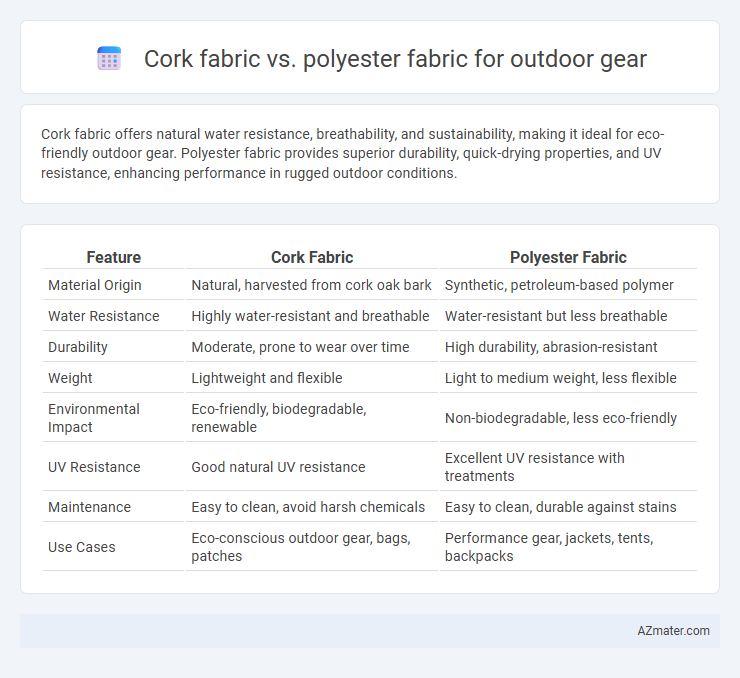Cork fabric offers natural water resistance, breathability, and sustainability, making it ideal for eco-friendly outdoor gear. Polyester fabric provides superior durability, quick-drying properties, and UV resistance, enhancing performance in rugged outdoor conditions.
Table of Comparison
| Feature | Cork Fabric | Polyester Fabric |
|---|---|---|
| Material Origin | Natural, harvested from cork oak bark | Synthetic, petroleum-based polymer |
| Water Resistance | Highly water-resistant and breathable | Water-resistant but less breathable |
| Durability | Moderate, prone to wear over time | High durability, abrasion-resistant |
| Weight | Lightweight and flexible | Light to medium weight, less flexible |
| Environmental Impact | Eco-friendly, biodegradable, renewable | Non-biodegradable, less eco-friendly |
| UV Resistance | Good natural UV resistance | Excellent UV resistance with treatments |
| Maintenance | Easy to clean, avoid harsh chemicals | Easy to clean, durable against stains |
| Use Cases | Eco-conscious outdoor gear, bags, patches | Performance gear, jackets, tents, backpacks |
Introduction to Cork Fabric and Polyester Fabric
Cork fabric, derived from the bark of the cork oak tree, offers a sustainable, lightweight, and water-resistant material ideal for eco-friendly outdoor gear. Polyester fabric, a synthetic polymer, is known for its durability, moisture-wicking properties, and resistance to stretching and shrinking, making it a popular choice for performance-driven outdoor apparel. Comparing cork fabric and polyester highlights their distinct advantages in terms of sustainability, breathability, and durability for various outdoor applications.
Material Composition and Sustainability
Cork fabric is derived from the bark of cork oak trees, offering a renewable and biodegradable alternative with natural water resistance and durability ideal for outdoor gear. Polyester fabric, synthesized from petroleum-based polymers, provides high strength and quick-drying properties but has a significant environmental impact due to non-biodegradability and reliance on fossil fuels. Cork's sustainable harvesting process contributes to carbon sequestration and reduced ecological footprint, contrasting with polyester's challenges in recycling and microplastic pollution.
Durability and Longevity
Cork fabric exhibits exceptional durability and natural water resistance, making it highly suitable for outdoor gear exposed to diverse weather conditions. Polyester fabric, known for its high tensile strength and abrasion resistance, offers significant longevity and quick-drying properties ideal for rugged environments. When prioritizing sustainability alongside performance, cork fabric provides a biodegradable alternative, whereas polyester relies on synthetic fibers that may degrade slower in natural settings.
Water Resistance and Weather Protection
Cork fabric offers natural water resistance and breathability, making it an eco-friendly choice for outdoor gear that repels moisture while preventing overheating. Polyester fabric excels in water resistance through synthetic fiber construction and can be treated with durable water repellent (DWR) coatings for enhanced weather protection against rain and wind. For extended outdoor use, polyester provides superior durability and faster drying times, whereas cork fabric prioritizes biodegradability and comfort in moderate wet conditions.
Breathability and Comfort
Cork fabric offers exceptional breathability due to its natural cellular structure that allows air circulation and moisture-wicking, enhancing comfort in outdoor gear. Polyester fabric, while durable and moisture-resistant, tends to trap heat and sweat, reducing breathability and potentially causing discomfort during extended wear. Outdoor gear made from cork fabric provides better ventilation and a more comfortable experience in active, warm environments compared to polyester alternatives.
Weight and Packability
Cork fabric offers lightweight durability and excellent compressibility, making it highly packable for outdoor gear such as backpacks and jackets. Polyester fabric, while generally heavier than cork, provides superior water resistance and abrasion strength, though it may add bulk when packed. Choosing between the two depends on the specific requirements for weight reduction and efficient storage space during outdoor activities.
Environmental Impact and Eco-Friendliness
Cork fabric, derived from sustainably harvested cork oak bark, offers a biodegradable and renewable alternative to conventional fabrics, significantly reducing environmental impact compared to polyester. Polyester fabric, made from petroleum-based synthetic fibers, is non-biodegradable and contributes to microplastic pollution and high greenhouse gas emissions during production. Choosing cork fabric for outdoor gear supports eco-friendly practices by minimizing resource depletion and waste, while polyester's durability often comes at the cost of long-term ecological harm.
Cost Comparison and Affordability
Cork fabric typically costs more than polyester fabric due to its natural, sustainable sourcing and unique texture, making it a premium choice for outdoor gear. Polyester fabric offers greater affordability with mass production and widespread availability, appealing to budget-conscious consumers seeking durable, weather-resistant materials. The cost-effectiveness of polyester renders it suitable for large-scale outdoor gear manufacturing, while cork fabric targets niche markets prioritizing eco-friendliness over price.
Performance in Outdoor Conditions
Cork fabric offers superior water resistance, natural breathability, and excellent insulation, making it highly effective for regulating temperature and moisture in outdoor gear. Polyester fabric excels in durability, lightweight properties, and quick-drying capabilities but can retain heat and moisture more than cork. For performance in harsh outdoor conditions, cork provides sustainable comfort and temperature control, while polyester delivers strength and fast moisture management.
Final Verdict: Which Fabric is Better for Outdoor Gear?
Cork fabric offers superior sustainability, natural water resistance, and breathability, making it an eco-friendly choice for outdoor gear, especially in mild to moderate weather conditions. Polyester fabric provides exceptional durability, quick-drying properties, and resistance to abrasion and UV damage, ideal for high-performance gear exposed to harsh environments. For outdoor enthusiasts seeking durability and weather resistance, polyester remains the practical choice, whereas cork fabric suits those prioritizing eco-conscious materials and comfort.

Infographic: Cork fabric vs Polyester fabric for Outdoor gear
 azmater.com
azmater.com